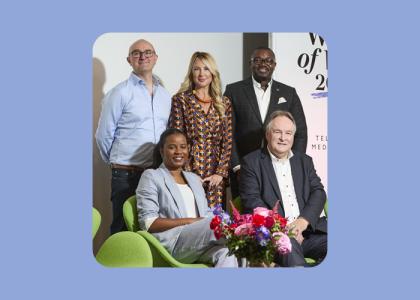Your workplace needs more WOW. Get ready for MHR's World of Work 2026
Key takeaways from MHR’s World of Work 2050 panel with the Telegraph Media Group

Hosted by futurist Tom Cheesewright, the World of Work 2050 event brought together four thought leaders for an inspiring conversation about the emerging trends and technologies shaping the future of work. Here are their key takeaways from the panel.
The idea of happiness at work has become increasingly important, with organisations placing more focus on ensuring that employees feel engaged and fulfilled by their jobs. The pace of change in the working world is only getting faster, and business leaders who want to futureproof their organisations for the road ahead are spending more time and resources on planning beyond the next five or ten years and looking ahead to what the world of work will look like in 2050.
These themes were a key focus at the event, attended by business leaders, executives and HR professionals all keen to gain valuable insights from the panellists:
- Tom Cheesewright, Applied Futurist
- Dara Douglas, Director of Digital Ways of Working, Cloud & Digital at PwC
- Duro Oye, CEO of 20/20 Levels
- André de Waal, Director of the HPO Center
- Sophie Howe, the former Future Generations Commissioner for Wales, who now runs Sophie Howe Associates
Reverse mentoring
“One challenge for the future of work is that multiple generations are still existing together in the workspace. How do we manage that, and in a positive way?” asked panellist Sophie Howe. “Through mentoring and the intergenerational sharing of ideas.”
Reverse mentoring flips the traditional concept of mentoring on its head by encouraging younger or more junior members to share their knowledge with more experienced colleagues. Howe previously led a programme for the 30 most senior leaders in Wales across private, public and charity sectors, with young people from different backgrounds and experiences. “One of the things that came out of it was reverse mentoring the chief executive of the Welsh Football Association [Noel Mooney], which inspired him to set up a strategy to make the FAW the most sustainable football association in the world.”
Also passionate about reverse mentoring was Duro Oye, founder of 20/20Levels, a career development non-profit that helps under-represented young adults navigate work and entrepreneurship pathways. Oye said reverse mentoring gives younger employees a sense of belonging and ownership while older ones gain empathy and new insights, and asked the leaders in the audience to reflect on how they can implement it:
“How can you learn from the next generation coming up? That’s one of the key bits of advice that we give to the corporations that we support because there’s so much they’re unaware of. But for the Gen Zers coming in, that’s their bread and butter. The future is going to be shaped by intergenerational collaboration; it can be something that we co-create together.”
Finding happiness, meaning and value in work
On the topic of younger generations, Oye added that they’re bringing new expectations to the workplace: “The next generation bring a values-driven mindset into the workforce. They’re digitally fluent, they’re self-taught, and they’re not afraid to disrupt the status quo.”
Increasingly, intangible aspirations – such as meaning, values, purpose and happiness – are influencing people when it comes to looking for a new job. Organisations that don’t adapt to this change will struggle to attract talent from Generation Z and even Generation Alpha, soon to enter the workforce. “Many employers haven’t got their heads around how much the paradigm of aspirations and expectations has shifted in just 20 years,” said futurist Tom Cheesewright. “The average age at which people buy a house, get married and have a child has shifted by a decade in 20 years.”
One such shift in aspiration has younger employees increasingly demanding to be co-creators in their firms’ endeavours, regardless of notions of seniority.
“Future generations do not want to subscribe to someone else’s dream. They want to feel like they’ve been part of creating that solution as well and are more likely to adopt what they’ve helped to create; what they have their fingerprints on,” said Dara Douglas.
People first, AI second
Douglas also addressed AI’s potential in fostering a happy work environment, where it could reduce mundane tasks and empower staff to focus on more rewarding elements of work – but crucially, she said, it needs to be implemented in a people-first way.
“There’s a lot of opportunity that technology can bring but it needs to be grounded in what humans actually need. There are masses of problems that AI can’t solve yet,” she said. “And they require diplomacy, negotiation, judgment, fairness, empathy and all those human skills that we need to lean into even more.”
High performing organisations create happier employees
Business theorist André de Waal has studied the connection between an organisation’s performance and the happiness of its employees and believes there’s conclusive evidence:
“The higher performing you are, the more happy your people are – and therefore the attractiveness of the organisation on the labour market goes up.”
De Waal’s research also shows that happiness at work comes from two things: enjoyment of the work itself and engagement with the organisation. “If happiness at work goes down, what most organisations do is tinker with work engagement – they try to make the work nicer. But they don’t spend enough time making the organisation better.”
To the panel it seemed clear that future happiness at work will stem from an organisation’s ability to foster real dialogue across the generations, cultures and value systems within.
This is a shortened version of an article produced by and published on Telegraph.co.uk – read the full article here. Photography credit: Tony Hay.


